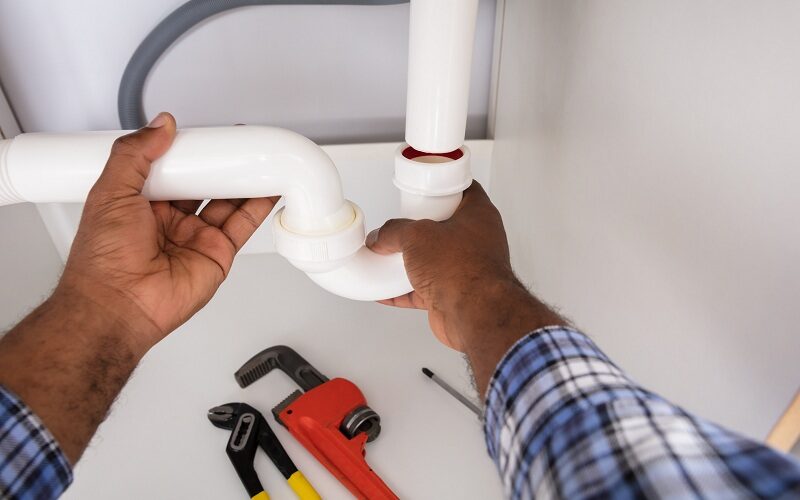As the temperatures rise this summer, it’s important to pay extra attention to your home’s plumbing system. By taking proactive measures to maintain your plumbing, you can avoid costly repairs and unexpected issues down the line. Hiring a professional plumber for regular inspections and maintenance can help ensure that your plumbing stays in top condition throughout the summer months.
Inspect and Fix Leaks Early
Leak detection is a crucial aspect of home maintenance that becomes even more important as temperatures climb. Leaks, no matter their size, can quickly escalate, leading to significant water waste and facilitating mold and mildew growth. Begin your summer plumbing maintenance by conducting a thorough examination of all visible piping, fixtures, and water-using appliances in your home for any signs of moisture, drips, or unusual water accumulation. Pay special attention to areas under sinks, behind toilets, and around water heaters, as these are common leak locations.
It’s also wise to listen for sounds of dripping or running water when all water sources are turned off, as this could indicate a hidden leak. Should you discover any signs of leaking, prompt action is required. Minor leaks can often be addressed with simple DIY fixes, such as tightening connections or replacing worn washers. However, more significant issues or leaks that are not easily accessible should be entrusted to a professional plumber to ensure a proper and safe resolution. Early intervention not only helps in preventing the escalation of damage but also contributes to water conservation and can lead to savings on your water bill. Keeping a vigilant eye on your home’s plumbing system and addressing leaks swiftly will safeguard your home against water-related damages and maintain its integrity during the summer season.
Prepare Your Plumbing for Increased Use
The summer season often brings with it a surge in household activities that can put additional stress on your plumbing system. From filling up swimming pools to increased shower usage and frequent hand washing from outdoor activities, your home’s pipes and water system can be under considerable strain. To preemptively address these potential issues, consider installing high-efficiency fixtures that reduce water flow without compromising performance. This simple upgrade can mitigate the risk of overwhelming your system and contribute to significant water savings.
Moreover, the increase in house guests and outdoor activities often leads to more waste and foreign objects being improperly disposed of down drains and toilets. Gently remind everyone in the home, including guests, of what should not be flushed or put down the kitchen disposal to prevent clogs and backups. Common culprits include cooking grease, food scraps beyond what a disposal can handle, wipes (even those labeled as flushable), and other non-degradable items. Establishing good habits and clear guidelines can help maintain the integrity of your plumbing during times of high usage.
For those with gardens or lawns that require frequent watering during the dry summer months, consider investing in a rain barrel or setting up a greywater system for irrigation. These steps not only lessen the demand on your plumbing but also promote water conservation and sustainability.
Taking these preparatory measures can significantly alleviate the pressures on your home’s plumbing system, ensuring it continues to function smoothly throughout the summer and beyond.
Keep Your Pipes Cool and Protected
During the sweltering summer months, the heat can wreak havoc on your home’s plumbing system, particularly the pipes. Exposed pipes are especially susceptible to the rigors of high temperatures, which can cause them to expand and, in worst-case scenarios, lead to bursting. This situation underscores the importance of shielding your pipes from the harsh summer heat. Insulating pipes is a practical approach to safeguard them against extreme temperature fluctuations. Focus on those areas that are most vulnerable, such as attics, basements, and crawl spaces, where the ambient temperature can significantly differ from the rest of the house.
In addition to insulating pipes, it’s beneficial to keep your indoor environment at a moderate temperature. Utilizing air conditioning or fans can help stabilize your home’s internal temperature, thereby indirectly protecting your plumbing. This effort is not just about comfort but also about preventing the thermal expansion of pipes which can result in costly damages.
Another aspect to consider is the external environment of your pipes. If you have outdoor plumbing, providing shade or coverage can reduce direct sun exposure, minimizing the risk of overheating. For garden enthusiasts or those with outdoor kitchens, ensuring that your external plumbing is covered or shaded can extend the life of these fixtures and prevent heat-related malfunctions.
Taking these steps to keep your pipes cool and shielded during the summer can avert plumbing emergencies and maintain the smooth operation of your home’s water system. It’s a proactive measure that, when combined with regular maintenance and inspections, can significantly contribute to the longevity and reliability of your plumbing infrastructure during the heat of summer.
Maintain Your Water Heater
The efficiency and longevity of your water heater are critical, especially during the summer months when the demand for hot water tends to spike. This can be attributed to more frequent showers, increased laundry loads, and the possible use of outdoor showers or pools. To ensure that your water heater can handle this uptick in usage without faltering, a professional check-up is highly recommended. This check should focus on assessing the unit for any signs of wear, corrosion, or inefficiency that could hinder its performance.
A key part of maintaining your water heater involves flushing it out to remove any sediment that has accumulated at the bottom of the tank. Sediment buildup can greatly reduce your water heater’s efficiency and, if left unchecked, can lead to overheating and eventual failure of the unit. Flushing the tank helps to clear out these deposits, allowing your water heater to operate more smoothly and efficiently.
Additionally, inspecting the anode rod is another crucial step in water heater maintenance. The anode rod helps to prevent corrosion inside the tank, and over time, it can wear down and cease to perform its protective role. Replacing a worn-out anode rod can extend the life of your water heater significantly.
For those with tankless water heaters, it’s important to have a professional perform a descaling process to remove mineral build-up that can affect water flow and heating efficiency. Regardless of the type of water heater you have, these maintenance steps are essential for ensuring that your system remains reliable throughout the high-demand summer months and beyond.
Outdoor Plumbing Maintenance Tips
Ensuring the functionality of your outdoor plumbing is just as important as maintaining the indoor system, especially during the summer when the usage of outdoor faucets, sprinkler systems, and hoses increases. Begin by inspecting all outdoor faucets for drips or leaks. A small drip can lead to significant water loss over time, so addressing these issues promptly is crucial. If you find any damage, such as cracks or leaks, consider replacing the fixtures to prevent further water wastage and potential damage to your home’s exterior.
Next, examine hoses and sprinkler systems for any signs of wear and tear. Hoses that are left out in the sun can deteriorate quickly, leading to leaks. Similarly, sprinkler systems should be checked for misaligned or broken sprinkler heads which can affect water distribution and lawn health. Making necessary repairs or adjustments ensures efficient watering practices and can help conserve water.
Clearing debris from gutters and downspouts is another critical step. Blockages can prevent proper water drainage, potentially leading to water damage on your property. Ensure that gutters are securely attached and that water is being effectively directed away from your home’s foundation to prevent any potential issues.
Lastly, consider the installation of a backflow preventer if one is not already in place. This device prevents contaminated water from flowing back into your clean water supply, a risk that can increase with the use of outdoor plumbing fixtures. Regular checks and maintenance of these outdoor components not only preserve the longevity of your plumbing system but also support the overall safety and cleanliness of your home’s water supply during the busy summer months.
Professional Inspection and Maintenance
For the ultimate peace of mind and assurance that your plumbing system remains in optimal condition, enlisting the expertise of a professional plumber is indispensable. These specialists bring a level of insight and skill that far surpasses the average homeowner’s capabilities, allowing them to diagnose and rectify complex issues that might not be immediately apparent. An annual inspection conducted by a plumbing professional not only ensures that every component of your system is functioning efficiently but also helps in identifying potential problems before they become critical. This proactive approach can significantly reduce the likelihood of emergencies, helping to avoid the inconvenience and expense of unexpected repairs. Utilize the expertise of a professional plumber to maintain the health of your plumbing system and secure its operation for the summer and beyond. If you are plumbing a home in Noblesville, Indiana call Coopers.










